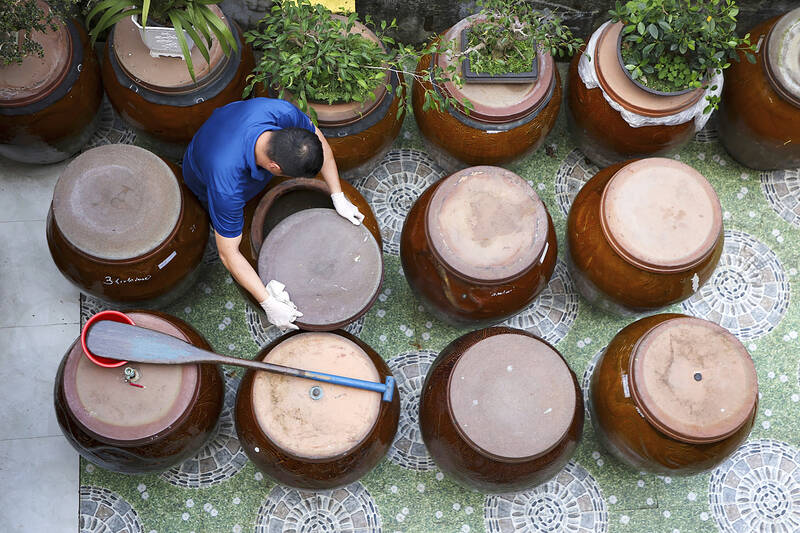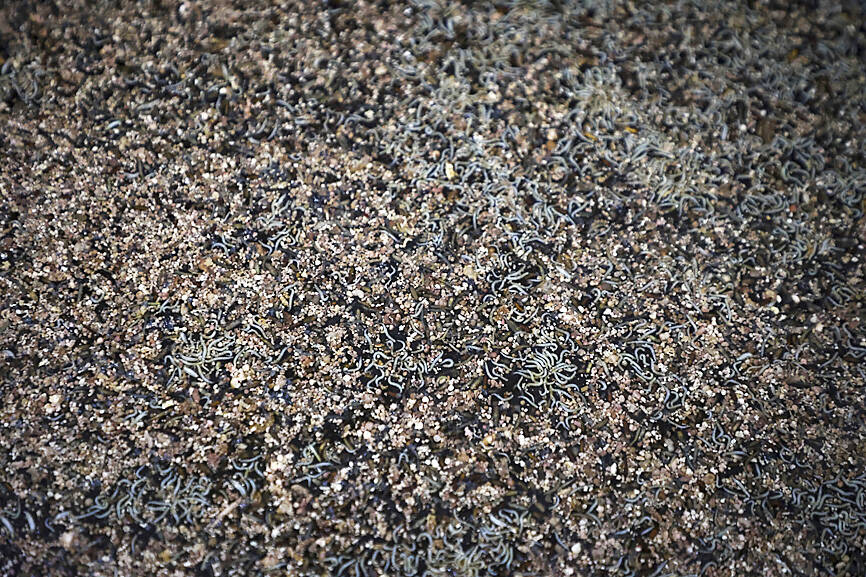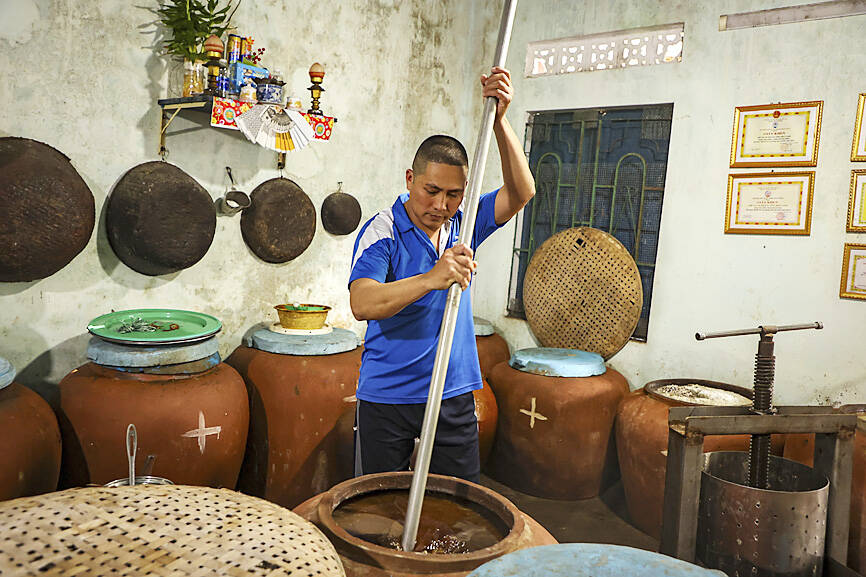Bui Van Phong faced a choice when the Vietnam War ended 50 years ago: stay in his small village, helping his parents carry on the family’s centuries-old tradition of making fish sauce, or join the hundreds of thousands of people fleeing his country for a better life.
Phong stayed behind and nurtured a business making the beloved condiment, known as nuoc mam in Vietnam, that is now in its fourth generation with his son, Bui Van Phu, 41, at the helm.
Fish sauce from the village has been recognized by Vietnam as an indelible part of the country’s heritage and Bui Van Phu is acutely aware of what that means.

Photo: AP
“It isn’t just the quality of fish sauce. It is also the historical value,” he said.
However, that heritage is under threat, and not only from giant conglomerates that mass-produce fish sauce in factories. Climate change and overfishing are making it harder to catch the anchovies essential to the condiment that underlies so much of Vietnam and Southeast Asia’s food.
Anchovies thrive in large schools in nutrient-rich waters near the shore, but climate change is warming the oceans, depleting oxygen levels in the water. Scientists have long said that this could lead to smaller fish, as large fish that need more oxygen might migrate or adapt over time by shrinking.

Photo: AP
Renato Salvatteci, who studies fisheries at the Christian-Albrecht University of Kiel in Germany, said his research into warmer periods millennia ago found support for that in the fossil record.
“If we continue with this trend of deoxygenation, anchovies will not be OK with that,” he said. “Every species has a limit.”
Breaching that limit would have global consequences.

Photo: AP
Warming oceans threaten the ocean ecology and the marine life that inhabits it. It might result in the proliferation of smaller, less nutritious fish and increase costs of fishing and consequently food.
For example, anchovies have an outsized role on marine ecology. They are food for other fish that people eat, such as mackerel. They are also vital to make fish meal, used to feed farmed fish.
Overfishing compounds the problem, and geopolitical tensions in the contested waters of the South China Sea — responsible for about 12 percent of the global fish catch — make management difficult.
The destructive industrial fishing practice of dragging large nets along the seabed, scooping up everything in a net’s path, has prevailed since the 1980s, but despite increased fishing, the amount of fish being caught has stagnated, a 2020 analysis of fishing trends showed.
Even if the world can limit long-term global warming to 1.5°C above preindustrial levels and halve fishing intensity, the South China Sea would still lose more than one-fifth of its fish stocks, a 2021 assessment by scientists from the University of British Columbia in Canada said.
In the most pessimistic scenario — temperatures rising by 4.2°C — nearly all the fish disappear.
Bui Van Phu, who teaches information technology by day, also works hard to perfect the fish sauce art handed down by his ancestors.
The anchovies are usually caught between January and March, when they congregate off the coast of Da Nang. If they are the right species and size, they get mixed gently with sea salt and put in special terra-cotta barrels. Sometimes worms or other ingredients are added to bring in different flavors.
Bui Van Phu ferments it for up to 18 months — stirring the mix several times a week — before it can be strained, bottled and sold to customers.
The sea salt imparts different flavor depending on where it comes from. So does the amount of salt used, and makers have their own recipes. The Bui family uses three parts fish to one part salt. The time allowed for fermentation, and the potential addition of other fish, also affect the flavor of the final product.
However, it is harder to get the perfect anchovies. The fish catch has decreased — fishers in markets across Vietnam rue that much of the fish they sell now was considered bait-size in previous decades — and Bui Van Phu said it is only the good relationships he has with anchovy fishers that allow him to get the fish directly, avoiding high market prices.
The unmistakable aroma of fermenting fish cloaks the homes of families that still make traditional fish sauce, but Bui Van Phu said that many families are thinking of getting out of the business because of high anchovy prices.
That might affect Vietnamese plans for a bigger share of the global fish sauce market — projected to increase in value from US$18.5 billion in 2023 to nearly US$29 billion by 2032, a report by Introspective Market Research Pvt Ltd showed.
Vietnam, along with Thailand, is the world’s largest exporter of fish sauce and is hoping improvements in food safety to satisfy standards in lucrative markets such as the US, Europe and Japan would help cement a national brand that helps advertise Vietnamese culture to the world.
It is hard to overemphasize how deeply the condiment is enmeshed in Vietnamese culture. Students living abroad speak of how its taste transports them back home and a top chef said it is the foundation for flavor in the country’s cuisine.
The tastes of different brews also means everyone — from top businesspeople to daily wage workers — has their own opinions about which is the best.
Bui Van Phu said that each family has their own secrets about making fish sauce.
Nearly fifty years since his father chose to stay back and take care of the family business, Bui Van Phu said he would like to pass those on to his own son.
However, he knows that it would depend on whether enough anchovies thrive in the sea for the craft to be viable.
“Fish sauce to me is not just a condiment for cooking, but it is our craft, our culture, our tradition that need to be preserved, safeguarded and inherited,” he said.

In Italy’s storied gold-making hubs, jewelers are reworking their designs to trim gold content as they race to blunt the effect of record prices and appeal to shoppers watching their budgets. Gold prices hit a record high on Thursday, surging near US$5,600 an ounce, more than double a year ago as geopolitical concerns and jitters over trade pushed investors toward the safe-haven asset. The rally is putting undue pressure on small artisans as they face mounting demands from customers, including international brands, to produce cheaper items, from signature pieces to wedding rings, according to interviews with four independent jewelers in Italy’s main

Macronix International Co (旺宏), the world’s biggest NOR flash memory supplier, yesterday said it would spend NT$22 billion (US$699.1 million) on capacity expansion this year to increase its production of mid-to-low-density memory chips as the world’s major memorychip suppliers are phasing out the market. The company said its planned capital expenditures are about 11 times higher than the NT$1.8 billion it spent on new facilities and equipment last year. A majority of this year’s outlay would be allocated to step up capacity of multi-level cell (MLC) NAND flash memory chips, which are used in embedded multimedia cards (eMMC), a managed

In the wake of strong global demand for AI applications, Taiwan’s export-oriented economy accelerated with the composite index of economic indicators flashing the first “red” light in December for one year, indicating the economy is in booming mode, the National Development Council (NDC) said yesterday. Moreover, the index of leading indicators, which gauges the potential state of the economy over the next six months, also moved higher in December amid growing optimism over the outlook, the NDC said. In December, the index of economic indicators rose one point from a month earlier to 38, at the lower end of the “red” light.

The global server market is expected to grow 12.8 percent annually this year, with artificial intelligence (AI) servers projected to account for 16.5 percent, driven by continued investment in AI infrastructure by major cloud service providers (CSPs), market researcher TrendForce Corp (集邦科技) said yesterday. Global AI server shipments this year are expected to increase 28 percent year-on-year to more than 2.7 million units, driven by sustained demand from CSPs and government sovereign cloud projects, TrendForce analyst Frank Kung (龔明德) told the Taipei Times. Demand for GPU-based AI servers, including Nvidia Corp’s GB and Vera Rubin rack systems, is expected to remain high,